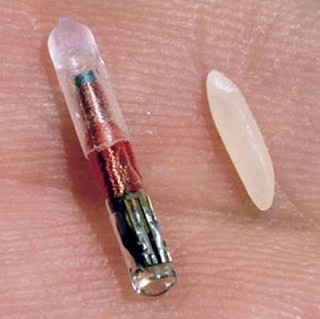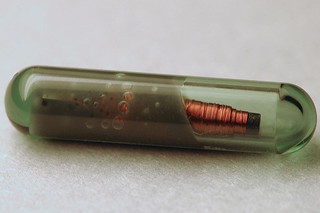
There has been a considerable amount of talk, speculation and fear-mongering going on about the next big leap in personal information and records keeping, namely: microchipping.
Recently I’ve read articles, watched clips of talk shows and seen many YouTube videos on the subject of placing microchips in people. Some say it’s a great idea, some have concerns over privacy, and some are yelling “Mark of the Beast” and quoting scripture.[1]
Microchips in Pets
As a pet owner I have been, and continue to be, a proponent of having pets chipped: this vastly improves the chances or your pet being returned to you if they somehow get away from you and lose their collar or tags.
These chips store a 12 to 16 character alpha-numeric code. That’s all. When a scanner triggers the microchip, it transmits its code and the signal can be read for a distance of up to 10 centimeters (about 4 inches). The veterinarian or animal shelter then uses the code shown on the scanner to query a database[2] over the internet which returns the name, address and phone number of the animal’s registered owner. But why chip people?
Microchips in People?
Researchers have been toying with this since 1998 when Professor Kevin Warwick experimented with an implanted “electronic key” that allowed him access to restricted areas in the lab and turned lights on and off as he entered and left rooms.[3] More recently discussion has turned to implanting a microchip capsule just larger than a grain of rice in a standard location – popularly the fleshy part of the hand between thumb and index finger – that could be used to help emergency medical personal retrieve a patient’s medical records even if the patient is unconscious.
Some claim that chips have been developed that will store a person’s entire medical history on the chip, but my research suggests this is hyperbole. Some claim that implantable chips are available that will allow the government to use GPS to track those people and know where they are at any given time. Again, research into current technologies suggests this is fantasy.

The chips that are readily available for use in humans are not much more advanced than those used in animals. If used in humans, the process will be similar; involving using a scanner to retrieve the stored code code/ID number then using that to retrieve information from a central database.
According to a press release by VeriChip, the corporation distributes a product called VeriTrace in response to the events of Hurricane Katrina. Basically, it implements GPS tracking capabilities, giving authorities the ability to track down missing people during disasters. It can also be hidden inside valuables to make recovery possible if stolen. But the VeriTrace GPS transceiver has dimensions of 99 × 85 × 58.5 mm, and a weight of 367g (approximately 4 x 3½ x 2¼ inches and 13 ounces): hardly implantable in a human or at least, not conveniently implantable in a human. They also offer a device called the MicroTracker that is the size of a digital wristwatch, but has a reduced signal strength.[7]
In 2002, VeriChip received approval from the U.S. Food and Drug Administration to distribute human implantable chips. By the year 2004, interest in chip implantation began gaining ground and the FDA approved human chip implantation. However, there is a lot of controversy about chipping humans and whether it is ethical. Since the inception of the chip, it has remained a choice to have the chip implanted or not. In 2007 California joined Wisconsin and North Dakota in banning human implanting of these tags without consent by enacting Senate Bill 362.[8] The federal government also speaks out for privacy, but has not passed any such legislation… and in 2013 and 2014 the N.S.A. proved that it cannot be trusted not to spy on US citizens without cause.
With the passage of the Affordable Care Act (Obamacare) interest in offering easy access to a patient’s medical records and insurance coverage has fueled the discussion of implanted chips. Proponents say chipping would go a long way toward reducing fraud and speeding admissions in emergency situations.
Big banks too have shown interest in using implanted ID microchips to reduce identity theft and credit card fraud. No more cards to lose or be stolen, just pass your hand over a scanner and key in a PIN number.If the same alpha-numeric string on a microchip could be used to access medical and financial data, people’s lives could be greatly simplified. If employers used direct deposit of paychecks, working folks would have easy, instant access to their pay with the wave of a hand. With such convenience and security, we could do away with physical currency and eliminate most muggings and robbery. Of course… that would mean anyone who chose not to be implanted could not buy or sell… and that brings us back to Revelations 13… doesn’t it?
More on Microchips in Humans:
1) Revelations 13:16-18
2) http://www.registermicrochip.com/
3) http://www.cnn.com/TECH/computing/9901/14/chipman.idg/
4) http://www.engadget.com/2007/02/14/hitachis-rfid-powder-freaks-us-the-heck-out/
5) http://en.wikipedia.org/wiki/Silicon-on-insulator
6) http://thefutureofthings.com/news/1032/hitachi-develops-worlds-smallest-rfid-chip.html
7) http://veritrace.com/microtracker.php
8) http://www.informationweek.com/california-passes-bill-to-ban-forced-rfi/201803861
9) http://www.foxnews.com/tech/2014/08/30/is-there-microchip-implant-in-your-future/
10) http://conservativeledger.com/nbc-news-dire-prediction-all-americans-will-be-microchipped-in-less-than-3-years-1/


Excellent post, Allan. I’ve been hearing about implanted chips — and the paranoia surrounding the idea — for at least ten years. I’m not sure exactly what the objection is, but I think the attachment of an electronic gadget to human flesh has something to do with it. But does it have to be an implant? It’s bad enough if a mugger takes my wallet. What if he decides to cut off my hand? (Sorry. I slipped into a little paranoia there myself.)
Hi Charles! Watching as our species wanders into the path of transhumanism (a.k.a. THE BORG) makes me very upset. But then I get squeamish at the thought of a mosquito penetrating my skin and exchanging fluids with me. Don’t EVEN get me started on intestinal parasites. Implanting a transmitter in my hand… nuh-uh, not for me. I’ll carry the debit card, thank you very much.
Allan, you presented a fairly benign pro-chip perspective. Allow me to unleash a very unbalanced conspiracy theory-soaked anti-chipping perspective.
Having a single identifier for all private information is a bit like having just your car keys to open your car, your garage, your front door AND your safe deposit box. Charles is right to be paranoid. Haven’t we seen enough movies where the bad guys rip out eyeballs for retinal scan access?
And let’s not forget norplant, or leaky silicone implants. Of course, there are good implants: titanium ball and socket hip replacements, pacemakers and the good ol’ metal plate in the head. They’re fine, until you want to travel by air. LOL
Seriously, though, there was a time when people were quoting the same verses about VISA cards…
…wait, maybe they were right!!!
Cheers,
Mitch
I seem to have missed your “unbalanced conspiracy theory-soaked anti-chipping perspective.”, Mitch. And I was So looking forward to it (because I’d probably agree with it). It is with great effort that, in my “reporting” articles I maintain a neutral perspective and allow the reader to make up their own mind. As for me; if I were mugged by some low-life I’d much rather hand over my wallet than have my hand slashed with a box knife to get my chip. And I’m still fuming that so much of the world has insisted on adopting our SSN as a universal identifier and insists on my giving it to them if I want to do business with them. :-/
I remember the first time I heard someone say, “I told them, ‘What do you need my SSN for? I’m here for a broken arm! Oh, it’s for the SYSTEM? Ha!'”
Shortly thereafter, a huge backlash resulted in the hospitals and later, most other institutions creating their own ID numbers. I never had the guts to give a fake SSN, though I know people who did. I agree that it just ain’t necessary!
I’m too mellow for rants, anymore. LOL Desensitization is a horrible thing. Adobe accounts breached, eh? Pass the salt.
Cheers,
Mitch
LOL! Love the attitude, Mitch. Maybe not so horrible; I bet you can sleep at night.